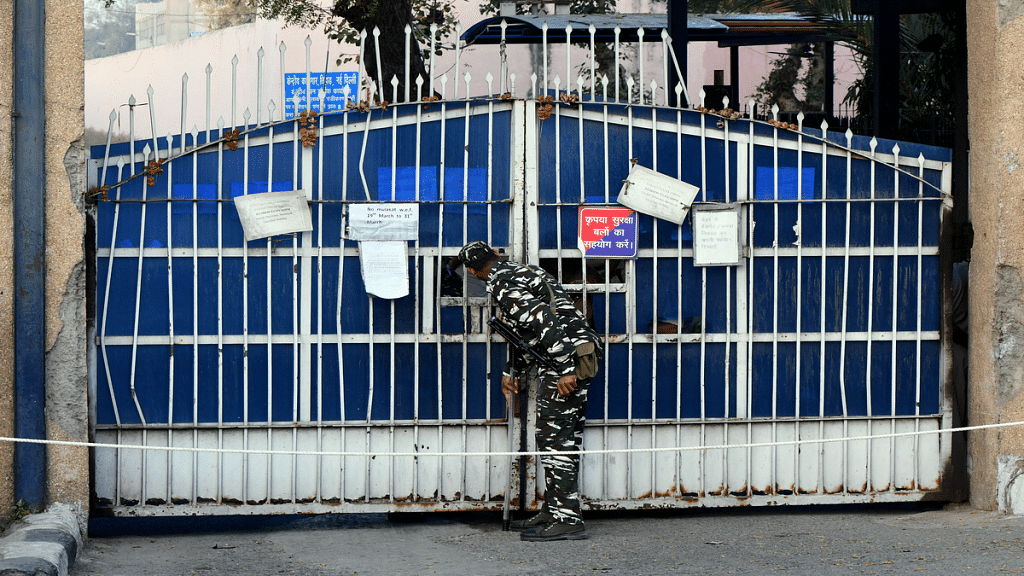New Delhi: Over 2,200 inmates in Delhi prisons, who were released on interim bail amid nationwide coronavirus lockdown, will now have to surrender. This has led to a fear among the prison authorities who say this could result in Covid-19 outbreak.
The Delhi High Court Friday said that its blanket order extending all interim stays and bails granted prior to and during the lockdown would not remain in effect after 31 October. All undertrials whose bail period was extended have to surrender in a phased manner between 2-13 November, it said.
According to the order, prisoners of Tis Hazari Courts will have to surrender before the jail by 2 November and prisoners from Rouse Avenue Courts Complex by 13 November.
A senior jail officer confirmed to ThePrint that over 18,000 prisoners will be in Delhi prisons once undertrials surrender at regular intervals.
Against the overall capacity of 10,000, Delhi jails already have 15,900 inmates.
On 25 March, the high court had extended till 15 May the interim orders in all matters pending before it and subordinate courts in view of the lockdown. Thereafter, the relief was extended from time to time and it was last extended till 31 October.
Also read: Delhi has 75% more prisoners than capacity, 69% of all prisoners in India are undertrials
‘Let’s bring an end to Covid chapter’
In its Friday order, the high court said the interim bail and interim stay extension order of March, which was extended from time to time, “was necessitated because functioning of the courts was curtailed due to complete lockdown declared on 25 March”, but “now the situation has changed and all the courts at high court and district court level are functioning through physical mode/video conference mode.”
A bench of Chief Justice D.N. Patel and justices Siddharth Mridul and Talwant Singh, modifying its March order, also said that there is no spread of Covid in jails and out of around 16,000 prisoners, only three are infected currently, and they have been admitted to a hospital.
The bench made the observations while hearing an application moved by the special prosecutor — Amit Prasad — dealing with the northeast Delhi riots cases in the trial courts, seeking modification of the high court’s 13 July and 24 July orders by which it had clarified that its orders extending interim bails/paroles would be applicable to everyone granted the relief before or after 16 March.
The application had alleged that the two orders were being misused by the accused in the riots cases by seeking bail on grounds of family illness or other such reasons, instead of seeking regular bail, and then getting the same extended on the basis of the high court’s direction.
The lawyer told the bench that around 20 accused in riots cases were out on interim bail on some pretext and are now enjoying benefits of the high court’s blanket order.
The Delhi government standing counsel (criminal) Rahul Mehra, appearing for the DG Prisons, told the bench that removing the blanket order would go against the spirit of the Supreme Court’s order to decongest jails during the pandemic as the coronavirus cases have not gone down in the national capital. He had also said that the decongestion of prisons has not led to any increase in crimes or anarchy.
The court said the jail authorities will make appropriate arrangements to ensure surrender of prisoners and take all required steps in view of guidelines issued by government authorities from time to time to contain the spread of Covid.
“As far as 2,907 prisoners, who have been granted bail on the recommendation of the High Power Committee are concerned, a request is made to the High Power Committee to take a decision in respect of the said prisoners within ten days from today,” the high court said in its order, a copy of which is with ThePrint.
The high court also said, “Let us bring to an end the Covid chapter. Let these people surrender or go back to jail. We passed the order in view of the pandemic. Our order has nothing to do with overcrowding of the jails. We are not concerned by the nature of the crimes.”
Authorities fear Covid outbreak
Commenting on the court’s order, prison authorities and advocates said the ruling could lead to a chaos and surge in Covid cases.
Speaking to ThePrint, advocate Ajay Verma, former convener of National Forum on Prison Reforms, said, “The number of Covid-19 cases are anyway on the rise in Delhi and this order will only add to the chaos.”
“Perhaps this was also a way to stop the extensions on all heinous cases including Delhi Riots case and the HC has left it to the concerned trial court,” he said.
A jail superintendent, who spoke on the condition of anonymity, told ThePrint, “We are slightly worried, but the decision isn’t in our control because at the end of the day the jails are already full and we will have to deal with more people so risk is bound to increase.”
According to data provided by the prison department, 215 of the 303 confirmed Covid cases till 15 October in Delhi’s three prison complexes — Tihar, Mandoli and Rohini– were among jail staff and the remaining 88 were among inmates. This was in contrast to the trend in jails across India where most Covid cases were reported among inmates.
Madhurima Dhanuka, head, Prison Reforms Programme, Commonwealth Human Rights Initiative (CHRI), said, “It defeats the purpose of reducing overcrowding in jails during a pandemic. We need to keep in mind the well-being of those with comorbidities or pregnant or aged and with so many people returning from parole might defeat the purpose.”
Also read: How prison populations can be protected from Covid-19
